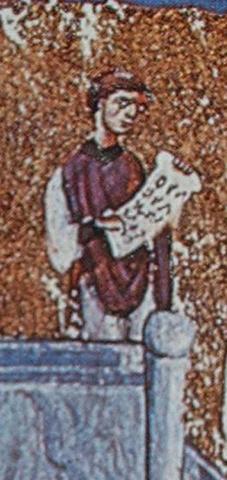James L. Franklin
Source - http://www.medievalists.net/2012/10/10/the-castrati-a-physicians-perspective/

A Byzantine castrato from the 11th century - Source: Wikipedia
The phenomenon of the castrati enters the history of Western music in the latter half of the 16th century, becoming a dominant factor in Italian music through most of the 17th and 18th centuries, and then gradually fading during the 19th century. To understand who the castrati were and to locate their place in Western culture we should explore the anthropology of human castration and when it was first employed in the service of vocal art. This will include a look at the attitude of the Church toward the castrati as well as their contribution to the history of opera. We will seek to understand the conditions that persuaded parents to submit their children to these procedures and the sociology of the castrati as a profession. Then there are those subjects germane to the field of medicine – how and by whom were these operations performed and what were the biological and pyschological consequences? What was the nature of their vocal art and what made their singing so appealing to the audiences of their day?
In 1977, Meyer M. Melicow, the Given Professor of Uropathology at Columbian-Presbyterian Medical Center in New York wrote that castration was one of the most common operations performed in the United States. At that time the operation was performed for prostate cancer and had entered 20th century practice of medicine as a result of the Nobel Prize winning discovery by University of Chicago urologist Charles Brenton Higgins, who discovered that the growth of prostate cancer was dependent on the stimulation of testosterone and that a significant remission could be induced by orchiectomy (removal of the testes). Writing on the history of castration, Dr. Melicow noted that through the ages the operation had been performed to retain supremacy of male elders, as revenge against enemies on the battlefield, on slaves serving as eunuchs in harems or seraglios, as punishment for rape, seduction and adultery, as part of self-inflicted religious rites, and to preserve a boy’s treble voice into adulthood. Ancient as well is the history of castration in the domestication of animals serving to produce capons, geldings and oxen and for taming our favorite pets.
History does not record when it was first recognized that the treble voice of a boy could be preserved and cultivated for singing by prepubescent castration. Vocally-gifted eunuchs were present in the early dynasties of the Imperial Chinese court and gelded choristers appeared in the Byzantine Empire as early as 400 AD. Mention of their highly sophisticated style of singing disappears after the sacking of Constantinople in 1204 during the 4th Crusade.